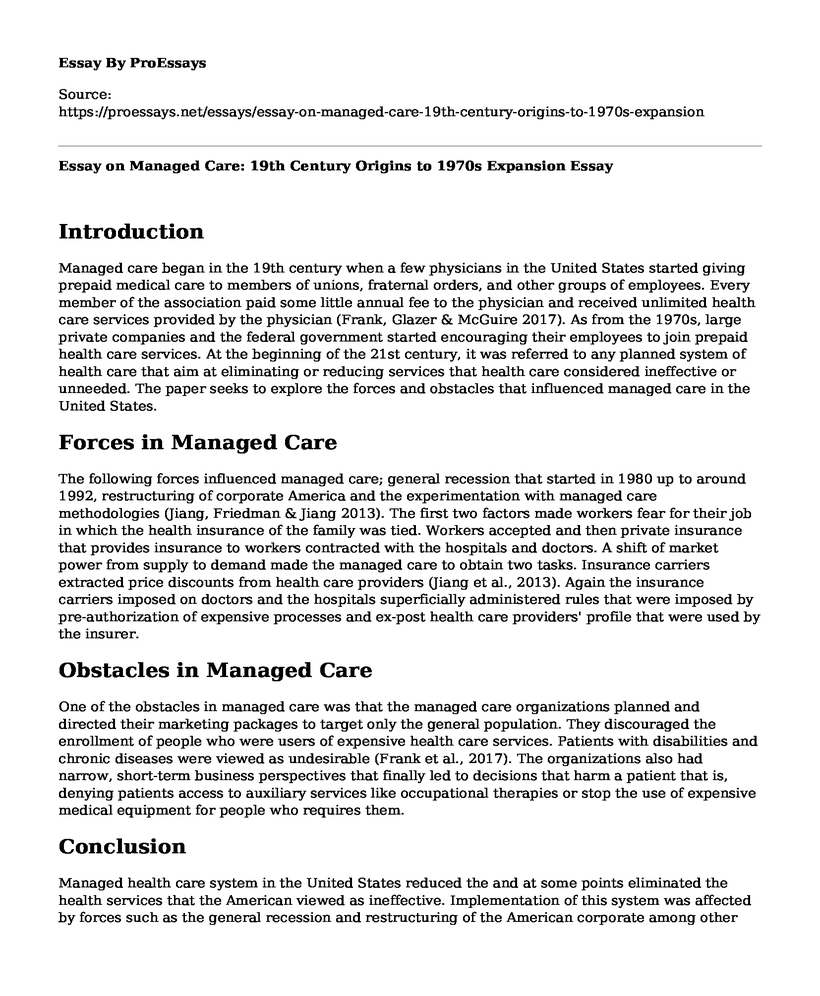Introduction
Managed care began in the 19th century when a few physicians in the United States started giving prepaid medical care to members of unions, fraternal orders, and other groups of employees. Every member of the association paid some little annual fee to the physician and received unlimited health care services provided by the physician (Frank, Glazer & McGuire 2017). As from the 1970s, large private companies and the federal government started encouraging their employees to join prepaid health care services. At the beginning of the 21st century, it was referred to any planned system of health care that aim at eliminating or reducing services that health care considered ineffective or unneeded. The paper seeks to explore the forces and obstacles that influenced managed care in the United States.
Forces in Managed Care
The following forces influenced managed care; general recession that started in 1980 up to around 1992, restructuring of corporate America and the experimentation with managed care methodologies (Jiang, Friedman & Jiang 2013). The first two factors made workers fear for their job in which the health insurance of the family was tied. Workers accepted and then private insurance that provides insurance to workers contracted with the hospitals and doctors. A shift of market power from supply to demand made the managed care to obtain two tasks. Insurance carriers extracted price discounts from health care providers (Jiang et al., 2013). Again the insurance carriers imposed on doctors and the hospitals superficially administered rules that were imposed by pre-authorization of expensive processes and ex-post health care providers' profile that were used by the insurer.
Obstacles in Managed Care
One of the obstacles in managed care was that the managed care organizations planned and directed their marketing packages to target only the general population. They discouraged the enrollment of people who were users of expensive health care services. Patients with disabilities and chronic diseases were viewed as undesirable (Frank et al., 2017). The organizations also had narrow, short-term business perspectives that finally led to decisions that harm a patient that is, denying patients access to auxiliary services like occupational therapies or stop the use of expensive medical equipment for people who requires them.
Conclusion
Managed health care system in the United States reduced the and at some points eliminated the health services that the American viewed as ineffective. Implementation of this system was affected by forces such as the general recession and restructuring of the American corporate among other forces. Again the managed health care encountered several drawbacks. For instance, the organizations that were providing managed care had marketing plans that could only target the general populations. It is important to note that managed care is a critical issue and has changed the lives of many Americans since the beginning.
References
Frank, R. G., Glazer, J., & McGuire, T. G. (2017). Measuring adverse selection in managed health care. In Models of Health Plan Payment and Quality Reporting (pp. 29-57).
https://www.worldscientific.com/doi/abs/10.1142/9789813202887_0002
Jiang, H. J., Friedman, B., & Jiang, S. (2013). Hospital cost and quality performance in relation to market forces: an examination of US community hospitals in the "post-managed care era". International journal of health care finance and economics, 13(1), 53-71.
https://link.springer.com/article/10.1007/s10754-013-9122-9
Cite this page
Essay on Managed Care: 19th Century Origins to 1970s Expansion. (2023, Jan 23). Retrieved from https://proessays.net/essays/essay-on-managed-care-19th-century-origins-to-1970s-expansion
If you are the original author of this essay and no longer wish to have it published on the ProEssays website, please click below to request its removal:
- Essay Sample on Human Resource Information System
- Research Paper on Banking Sector and Development of Corporate Governance in Mauritius
- Essay Sample on Primary Hypertension and Genogram
- Essay Sample on Pediatric-Clinical-Child-Services: Critical for Child Well-Being
- Leadership Qualities: Essential for Achieving Organizational Goals - Essay Sample
- Essay Example on Nutrition, Health & Learning: Why Investing Now is Vital for Our Future
- Essay on Nursing Leadership in Times of Crisis: Demonstrating Governance Skills Amidst the Pandemic







